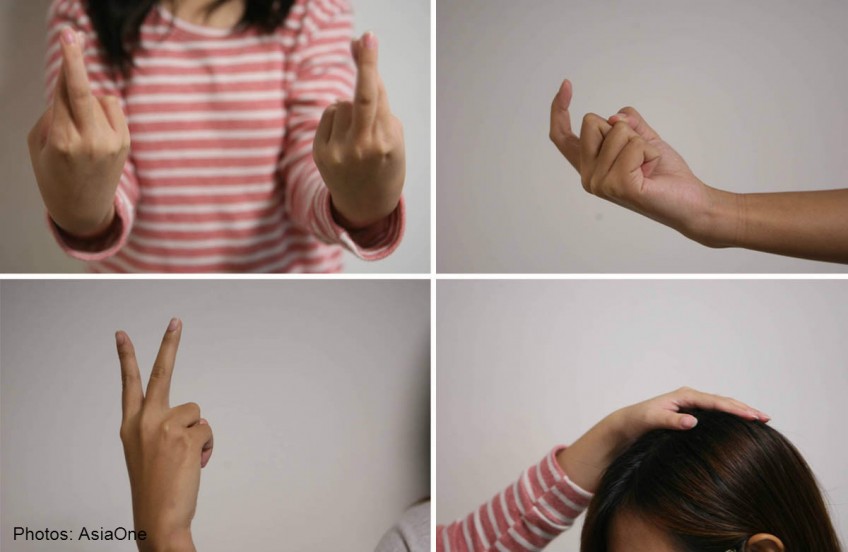10 innocent hand gestures you should never use abroad


Want to express your approval or understanding of something? Instead of saying it out, you might give simple hand gestures like a thumbs-up or an OK sign.
Such gestures are an easy replacement for verbal speech. Yet, if used in the wrong country or context, may have other unintended repercussions.
Hand gestures are culture-specific and can convey very different meanings in different social or cultural settings. The innocent thumbs-up, for example, means "up yours" in Afghanistan, Greece and parts of Italy.
Travel website SmarterTravel has a list of innocent hand gestures you may want to avoid using when travelling abroad and which countries to avoid using them in. Read on to find out more.
1. Peace sign with palm facing inward
A simple change in the direction your palm is facing while giving the peace sign can make all the difference between wishing someone peace, or insulting them.
Make sure that when you have your index and middle fingers pointed up in the V shape, your palm is facing outward. Otherwise, you're signalling to others, the equivalent of the middle finger in the United Kingdom, Ireland, Australia, and New Zealand.
Avoid using in: United Kingdom, Australia, Ireland, and New Zealand.
2. Thumbs-up
You may think that the thumbs-up gesture may a universal sign of approval in Singapore and on Facebook, but in Afghanistan, Iran, Greece and parts of Italy, it means "up yours".
So next time you want to show your appreciation for something while travelling in these places, you should reconsider before sticking out your thumb.
Avoid using in: Afghanistan, Iran, parts of Italy, and Greece.
3. The OK
Turns out, making a circle with your index finger and thumb is not OK in some countries.
In France, for example, showing the gesture to someone is to tell them they are "worthless". In certain Mediterranean countries like Venezuela, Turkey, and Brazil, the OK sign is a vulgar slang that will offend almost anyone you flash the gesture at.
Avoid using in: Turkey, Brazil, Venezuela, and France.
4. Finger summoning
If you are travelling in the Philippines and want to call someone over to you, avoid using your curled index finger to summon them. That is reserved for calling dogs and is considered very rude.
In Singapore and Japan, curling your index finger with it pointing upwards signifies death, and is considered bad luck.
Avoid using in: The Philippines, Singapore, and Japan.
5. Left hand
Sorry, lefties. You may need to become ambidextrous, or at least learn to eat with your right hand, when in the Middle East, India, Sri Lanka, and Africa. In these countries, people normally eat using their right hand instead of utensils, and they use their left hand to clean themselves after using the bathroom. Hence the left hand is traditionally thought of as unclean.
Avoid using in: The Middle East, India, Sri Lanka, and Africa.
6. Stop
If you are trying to stop someone in Greece, avoid using the palm-out, fingers-up gesture, it will not have the effect you intend or your message will not get across to the Greeks. To them, that motion is an insult and a stigma that apparently dates back to Byzantine times, when chained criminals were paraded through the streets and members of the public were allowed to smear charcoal or faeces in their faces using their open palms.
Avoid using in: Greece.
7. Fingers crossed
Wishing someone good luck? Try not to cross your index and middle fingers at someone in Vietnam, where crossed fingers symbolise a part of the female anatomy and can be considered very vulgar when flashed at another person.
Avoid using in: Vietnam.
8. Devil horns
In European countries like Italy, Spain, Portugal, Brazil, and Colombia, one would be wise to avoid flashing the "devil horns" (with your hand in a fist and index and pinky finger extended) at others, even during metal concerts. In these countries, the hand gesture can be used to express that someone's wife has been unfaithful.
Avoid using in: Italy, Spain, Portugal, Brazil, and Colombia.
9. Arm wave
When you are travelling in South Korea, try not to wave someone over to you or hail a cab with your palm facing up - that is how Koreans summon their dogs. Instead, wave your hand up and down vertically with your palm facing down.
Avoid using in: South Korea.
10. Pat on the head
The Thais view the head as the most sacred part of the body. In the Buddhist faith, the head is where the spirit lives. So avoid patting another person's head for a job well done or ruffling their hair, or you risk offending them.
Avoid using in: Thailand.
ngkaren@sph.com.sg